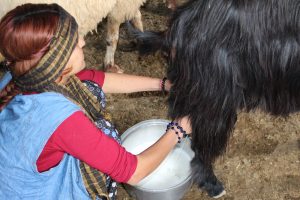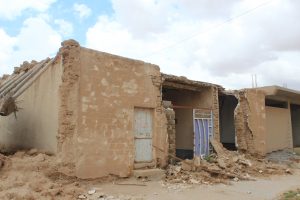This article is part of our series on life for Êzidî (Yazidi) women, written by a member of the Internationalist Commune who is currently working in the women‘s structures in Shengal.
Only the Kurdish movement intervened when the Kurmanci-speaking Êzidî people suffered genocidal massacre at the hands of Daesh in 2014, yet earlier this year the guerillas were forced to withdraw from Shengal. Meanwhile the Êzidîs face continued repression and discrimination from the hostile Iraqi state, who stand by as the fascist Turkish army launches assaults on the Shengal region.
Our comrades in England, Plan C, are currently raising money to tackle the severe health crisis among the Êzidî people in Shengal. See here to learn more about their campaign and the struggle of the Êzidî people, and how you can send financial support.

This is a story of thousands upon thousands of lives, thousands of women, thousands of experiences, thousands of real people, like you and me, who lived through unimaginable horror. Via smartphone and in the slavemarkets of Mosul and Raqqa, women were again and again sold for a handful of dollars, dressed like dolls, bartered like cattle. Around 7000 Êzidî children and women were captured and exploited by Daesh.
Slowly, with the fall of ISIS, many women and children were able to return. Many others did not survive their ordeal, or are still missing. Return to their home regions after years of captivity, many faced additional difficulties: profound physical and mental trauma, untreated PTSD and sexual health issues, psychological isolation from their homes and communities. Their hometowns are destroyed, their old houses only ruins, their family members dead or missing or fled into exile.
But where there is life, there is hope. This is the story of Zamîra.
Q: Tell us a little bit about yourself, please.
: My name is Zamîra Hadcî and I am 20 years old. I have five sisters and four brothers, and I’m from Shengal City.
How were you captured by ISIS?

On the 6th August 2014 my parents and some of my brothers and sisters were in Bashûr [the Kurdish Autonomous Region of Iraq]. Just my two older brothers, my younger sister Asîma and I were at home. ISIS fighters came into our house, shot my oldest brother as he tried to protect us, and took the other three of us with them. It was a hot day. I still remember how we tried to hide in the house, but it didn’t help.
Zamîra, you were more than three years in the hands of ISIS, right? How were you able to stand it?
They tried to make us Muslims, to make us forget that we were Êzidîs. They made us read the Koran every day and threatened us with death if we refused to convert. They sold me every day, or every two or three days, to different men. They sold me for a car, for some money. Sometimes just for a cigarette. At some point I just gave up. I never thought I would see my family again, never thought I would one day be free again.
When the war came to Raqqa the democratic forces who liberated the city brought me to a camp. Hundreds of ISIS families, former wives of ISIS fighers and children stayed there. I was very afraid and for weeks I told no-one that I was a Êzidî. But in the end I trusted a Kurdish women and she arranged to bring me home.
Your home, the Shengal region, changed a lot since 2014. What did you feel, what did you see, when you came back?
Our house in Shengal city is completely destroyed. Everything is destroyed. The city is completely empty and demolished. Only some hundreds or maybe one thousand families came back. My family lives now in Borîk, in the house of my uncle, who went to Germany.
My little sister came back a year earlier, but my brother is still missing. When I saw my parents again I cried a lot. Before I didn’t cry for a long time, but when I saw my family I cried a lot. My mother also cried, and even my father. Two of my sisters married and went to Germany, while my brother is married and lives in Bashûr. My father has no job, but my other brother is now Asayîsh (community-based police). I’m happy to be back with my family, but everything has changed. The whole region is totally empty, a lot of people are without work and many want to go to Europe.
How do you want to go on? What are your wishes for the future?
I just hope that the war will be over and that my brother will come home. I want all the people to come home. Only together we can build up Shengal again. I want a future for the Êzidîs here, in our home region, not somewhere in exile.
And do you want to marry, or to finish your school and work?
No, I want to stay with my family.
Thank you, Zamîra.